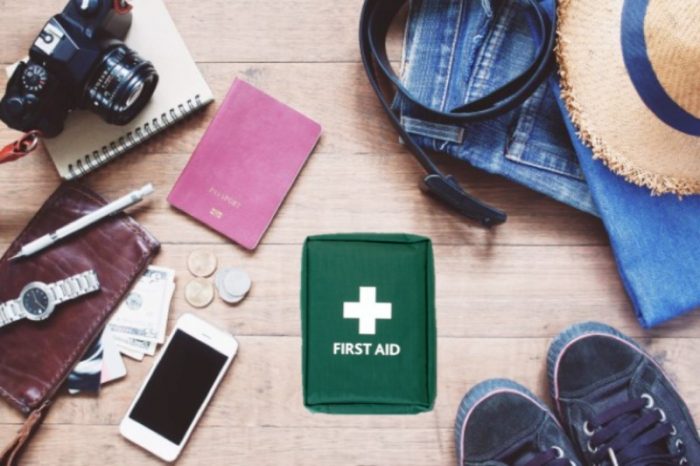
No one likes to get sick when traveling, but it’s always better to be prepared than left with a cold and no medicine abroad. Making room in your luggage to bring over-the-counter medications is a must in case something you are really not expecting happens.
According to Emily Scott, a registered nurse for eight years that frequently travels abroad for medical services, these are the 10 over-the-counter medications that you should bring when travelling!
10 Must-Bring Over-the-Counter Medications When Traveling
1. Anti-diarrheal, like Immodium
Traveling to a different place means eating and drinking things your body might not be used to. And if your tummy isn’t cooperative enough to adjust for that something “new”, chances are you’ll get struck down with the traveler’s diarrhea.
So, bringing an anti-diarrheal medicine (like Immodium) will save you, especially if you are not in a state to look for and run to a local pharmacy store you are not familiar with. But if the symptoms get worse even after taking anti-diarrheal, it is time to see a doctor to avoid complications.
2. Mild laxative, like Dulcolax
Constipation can be prevented by eating fiber-rich foods and drinking plenty of water. But traveling can disrupt you from keeping up with the routine, and constipation may hit you! Bringing this over-the-counter medication is a big help. To ease away the discomfort and to let you enjoy your long-awaited time for a vacation, have this medicine on hand.
3. Mild pain reliever, like Tylenol or Motrin
Don’t let pain stop you from doing the activities you want to do. For pain relief, you can depend on Tylenol, which is generally better for headaches, while Motrin is effective to reduce swelling and inflammation.
This is also a good item to have on hand for menstrual cramps that often stop women from totally enjoying their time. But remember to take these over-the-counter medications as recommended, as they can affect your kidneys and liver if used in excess.

4. Antibiotic ointment, like Neosporin
Antibiotic ointment can help to speed up healing and prevent scarring of cuts and wounds. But before applying it, wash and clean the wound first with water and soap.
Keep the affected area covered, and watch for signs of infections like redness, swelling, or fluid draining from the wound. And if firm pressure is applied but the wound’s bleeding doesn’t stop, it’s time to see a doctor.
5. Antihistamine, like Benadryl or Claritin
Antihistamines are used for allergy relief, and bringing some when you travel can really be a big help. But take note on using some antihistamines like Benadryl, because they can make you feel quite drowsy.
It is not ideal to drink while taking this medication, so consider that if you have a night of fun planned abroad. If you experience difficulty breathing while having an allergy attack, it is better to head to the hospital to avoid serious problems.
6. Sleep aid, like Melatonin
Traveling to a country with a different time zone can throw off your body’s internal clock. It can also interfere with your ability to get a good sleep. In this kind of situation, taking in some sleeping pills like Melatonin will be a great idea.
Melatonin works with your body’s clock, helping it to know when it’s time to sleep, wake and eat. It also helps regulate your body temperature, blood pressure, and hormone levels. It is not habit-forming and is a supplement form of hormones our bodies naturally make, so taking it few nights in a row is safe.
7. Common cold remedies, like Sudafed or Mucinex
Having colds while traveling can really be irritating. Medicines like Sudafed or Mucinex can help reduce cold symptoms.
Bringing a decongestant nasal spray, cough suppressant, or expectorant can be helpful, too. But the best cold treatment is to have good rest and drink plenty of water so you’ll stay hydrated.
8. Motion-sickness medication, like Dramamine
For motion sickness when traveling, over-the-counter medications like Dramamine can help you get through the day. But Dramamine can make you feel drowsy, so be sure to have it when you are going to have a long trip so that you have enough time to sleep.

9. Electrolyte tablets
Having some electrolyte tablets in your carry-on when traveling can help you stay active throughout the trip. This over-the-counter medication helps you in times when you get dehydrated, especially on long travels where clean water is sometimes hard to find.
If you are feeling lethargic, have a headache, or have dry mouth while on a trip, these are signs that you could be dehydrated. In a water bottle, just drop an electrolyte tablet to replenish what you’ve lost to help you feel better.
10. Hydrocortisone cream
Hydrocortisone cream is used to treat a variety of skin conditions like insect bites, poison ivy, eczema, dermatitis, allergies, and rashes. It also reduces swelling, itching and redness that occur with the said conditions.
It is best to have it with you all the time when travelling, especially if you are a hiker or if you are traveling to a tropical country where population of insects is huge.
These over-the-counter medications only serve as first aid relief. It is always advisable to check with your doctor first on what medications you should take that will be safe for you.































